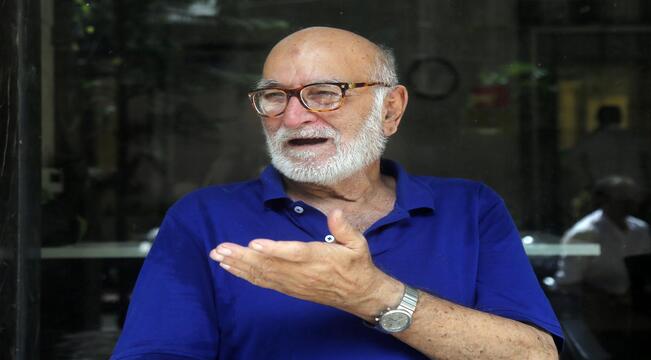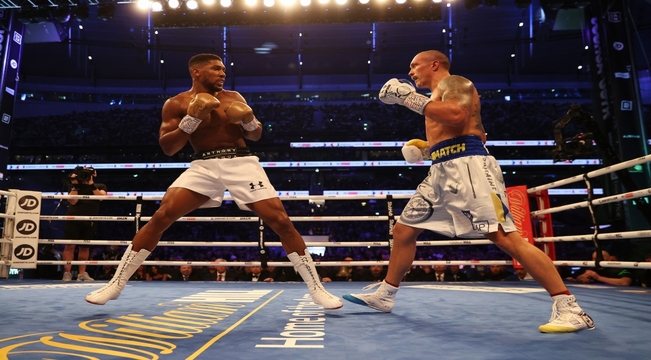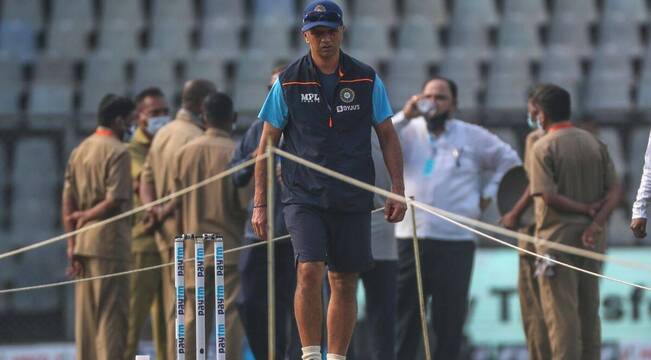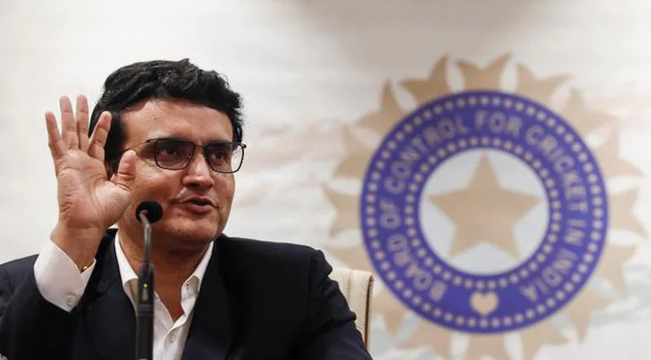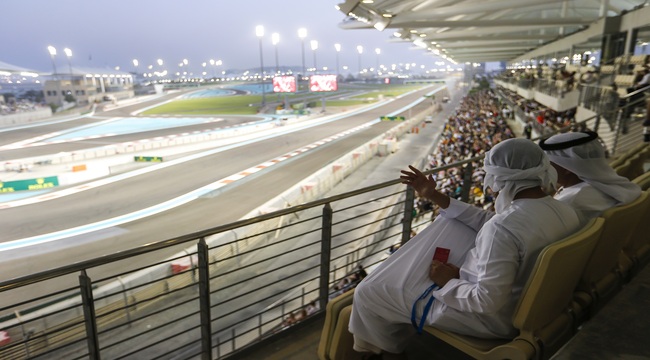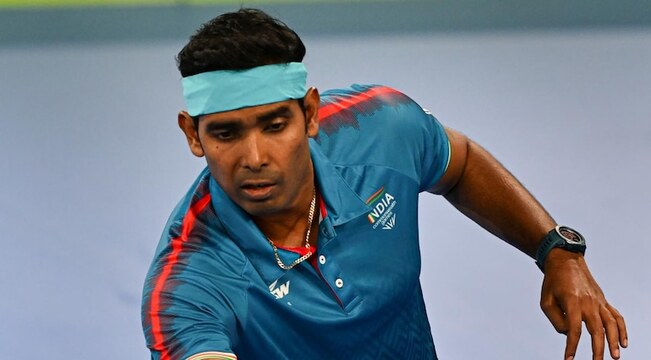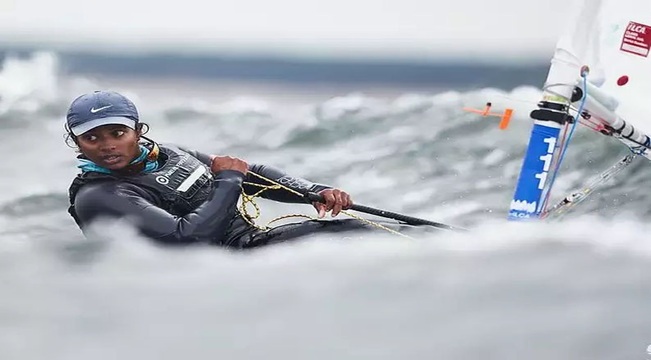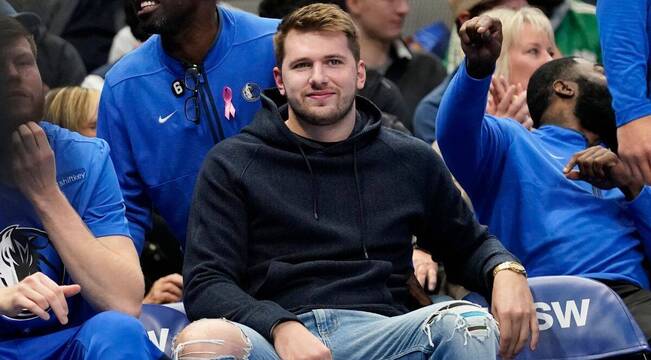New Delhi, November 17, 2022: Abbas Moontasir was the original angry man of the 1970s.
He may have copped a knockout loss to Amitabh Bachchan in the boxing ring in the movie Naseeb, in which he played a bit-part role, but on the hoopster’s court the tallest of players and most powerful referees quaked at the sight of the ‘5’11” playmaker.
Be it his clever passes whizzing past a defender’s nostrils or skimming around the knee, as Abbas released a shooter free around the high post to point. Or be it referees who would be packed off to refer to the rule books and not show up till they had brushed up on the minutest clauses of the game, shuddering if they got it wrong.
One of India’s greatest ball handlers and the most charismatic part of the star studded Railways team that won 9 titles out of 10 played domestically in the 60s and 70s, passed away in Mumbai at the age of 82. Suffering from respiratory trouble.
Abbas had been on a ventilator for two days. He is survived by his wife and a daughter, as well as elder brother Jaffer Moontasir.
Abbas who grew up on the tough lippy courts of Mumbai’s Nagpada and led India to its best 4th place finish at the 1975 FIBA Asian Championship, thought a mis-pass or a mistaken ref call ‘a crime against basketball itself’, and wasted no time in calling out the guilty on the spot.
A Pietro Maximoff when he moved, and a steaming Hulk when he stopped play to take up matters with the ref, Abbas was a force to reckon with.
Such was the blazing respect for his sense of playing the game right, that though he often got banned by officialdom for protesting against unfairness (he would slam the ball on the court with a bang in anger) and missed out on India tours paying for his defiance, referees still respected his knowledge. Players changed game styles mid-dribble, never regretting listening to his audible scoldings.
Doyens such as Surendra Kataria, Sarabjeet and Gurdiyal or younger shooting forwards like Ramkumar watched their basket tally double in games where they were fed by Abbas and his chess-move like passes, owing to a game sense nurtured on the rough hardy courts of Nagpada and Madanpura in Central Mumbai.
He once went to great pains to explain a game violation to a ref, who was confused about a restart, telling him to recall which shoulder had dipped when the player’s feet landed from the jump. For that would indicate what footstep to resume with – right or left. The referee, from the police team incidentally, was gobsmacked but grateful for the instant interpretation. “There are rules, and they must be obeyed,” he would say, in the more colourful central Bombay language that English would never encapsulate.
Still, what made Abbas an all time India All star was his unparalleled defensive abilities, where the 6’5″ upward giants in rival teams were left scampering and tangled as the blitzy guard, not even 6 feet, out jumped them.
“Here in Nagpada, we didn’t believe in height being supreme, maaloom hai. It was about quickness and excellent footwork in timing the jump. Abbas would say, jump mein nikaalenge basket, Khushiram (he was 6’7″) ko nachaaenge (We will block Khushiram),” recalls Abbasi’s lifelong mate and Railways forward Afzal Mamu. “There will never be a player like him in India. Nagpada’s finest,” he added.
Bachhoo Khan school
Abbas Moontasir was born to a carpet merchant of Iranian lineage at the Mustafa Manzil in Nagpada, Mumbai basketball’s spiritual home. Filigreed balconies and warm orange bulb lit buildings look out on the centrepiece of the basketball court, and both the Mastaan YMCA and legendary coach Bachhoo Khan’s camps from the 1950s would train young, restless boys into ball players.
Discipline and hard work were non negotiable, sticks and smouldering verbals freely employed. But Bachhoo bhai (Mustafa Khan) was a stickler for rules, from where Abbasi picked his own sense of fairness, and love for minute details.
The late Tom Alter had once told The Indian Express how he reconnected with basketball at Nagpada and was altogether a fan of Abbas Moontasir, when he started playing in Bombay. But the reason why a 5’11” could coolly take on a 6’8″ as Abbas urged his team to go man to man marking, was Nagpada’s nurturing confidence.
“We had an Azad Cup only for kids under 5 feet. They were measured with tape at the start, and would dread growing taller lest they miss out on playing in this famous competition. So Bachhoo bhai started a Palampur Trophy for those under 5’3″. Nagpada kids were taught to never be afraid of height or see it as a drawback and were trained to take on taller players with speed and skill,” Afzal explains.
Abbas would grow up to be the most flamboyant of the lot, plus armed with knowledge.
It’s why Abbas would confidently debut against a visiting Australian side returning from the Rome Olympics. He was a precursor to India’s legendary Ajmer Singh – Hanumant Singh pairing of playmaker – centre, with the latter gaining reassurance and a bag of tricks as playmaker from Abbas’s apprenticeship, as Western Railway virtually had 10 India players of the 12, and hassled the Services teams no end.
His speed and game sense were renowned, but Abbas had other notable eccentricities that magnified his effectiveness in the game. “He had a very high dribble, never seen it in anyone. He didn’t bend his knees, never seen players like him. So the high ball bounce while he stomped like a king would scare opponents and his eyes would be piercing as ever scanning the court for empty spaces,” says Babu Hamid Khan, his junior and latter day India centre. His twinkling fierce eyes would see gaps on court only his own forwards would sense, to fetch up to receive his near cerebral passes, and his wrists could feint and send defenders the other way.
Though in later years, Services’ and India’s Sambhaji Kadam and his flashy style of no-see bullet passes would annoy Abbas no end. Not because Sambhaji was too flamboyant, but because neither his own teammates nor defenders could see through his tricks and glean the plays. “Samazhta nai hai gadhon ko, (the donkeys don’t understand)” he would once chortle.
It is said that hundreds would throng Nagpada and even Railways training grounds at Ajmer, Jaipur and Kota for 10 days just to watch Abbas practice. Jovial when outside the court with his clipped baritone rising when teasing his ex teammates, Abbas was known to be dire serious at training according to the reports published in indianexpress.com.
“Kisika daant ni dikhna chaaiye practice mein (Teeth should not show during practice). He wouldn’t let anyone so much as smile. And if you missed a pass, he would spell out the calculations of the lapse and thunder ‘you fool, you cost us 4 points!”
Later, he would explain to Afzal, it was two points that the shooter missed out on for the shoddy pass, and the 2 the opponents ended up scoring on the fastbreak. He would threaten to bench the offender with a roaring ‘bitha dunga tereko’ (will bench you).
“Crowds went mad because of how he got angry at the referees. They loved his anger, and how he schooled officials and ball patak deta tha,” Afzal recalls.
In training, after Nagpada got floodlights fixed, he would still drag the team to start training at 3.30 pm. “Dhoop mein mehnat karenge toh shaam ko floodlight mein daraaenge opponent ko aur bhaagambhaag karke respect milegi, (If they train hard under the glaring sun, they’ll be able to shine in competition under floodlights)” he would say.
Four hours of intense practice, with dedicated shooting-at-clutch training and stamina work would be Abbas’s way, though gym work was virtually unknown.
Prepping his side for a hustling, hassling physical game which helped even India cope at the international level, was down to Abbas’s thinking as he could extricate himself even out of triple-teaming. Losses per se didn’t thwart him, and Babu Hamid recalls one time, when Abbasi clapped him on the shoulder and said: “Missing shots will happen 50 more times in basketball, ro mat. Don’t cry.”
Referees ensured he was banned for two years and didn’t travel abroad then, but he had set the high standards for playmaking in India as he remained Maharashtra’s only male Arjuna awardee in basketball.
Abbas noticed technical glitches others wouldn’t even know of. “He would diagnose that the index finger wasn’t touching the ball in a free throw and predict a miss. Eagle eye. He would say “Palm ke andar vacuum nai banaa hai (There should be no vacuum in the palm)” while pointing out faulty shooting and dribbling. Late into his 60s, he would sit and watch u-13 matches and be delighted about new ways of passing, he spotted, asking older players to learn,” Noor Khan, his junior recalls.
“Kya dushman log, kaise ho” was Abbasi’s favourite greeting, him later explaining that most people were not refined in the art of basketball, lacked game sense and hence were enemies of the sport. Hence the affable dushman.
Abbas’s pithy pointed piercing remarks at Mumbai tournaments in the last 20 years would draw an audience of its own. He knew to troll – albeit fairly – before social media even got invented, but players appreciated his blunt observations.
Teams could swap man to man defense for zone and rack up 20 point leads from trailing by 10, because Abbasi would be thundering down at them.
As a player this one time, Central Railway regretted starting to celebrate with 10 seconds left, as Abbas completed a counter in the last 5 seconds to win by a point for Western Railway. And this other time he refused to pass and accepted a 2 point loss when his team were down to 4, with others fouled out. “Bewakoof, 20 point se haarte if it went into extra minutes (Idiot, we would have lost by 20 points if we took the game into extra minutes),” he told a teammate.
What endeared him to the community though was his childlike love for ice cream. He could slurp up 1 kg packs, Afzal recalls.
“He would say I’ll come for a wedding only if there’s double scoop ice cream, I don’t care for the food. Rishwat deni hai toh chocolate de, (If you want to bribe, give chocolates)” Noor Khan, his junior recalls. “His love for sweet was altogether something else. Even when diabetes wracked him, he’d say, chal na, kal ka marnaa, aaj mar lunga. Lekin pehle meetha khaake jee toh lu, (Come on, I might die today instead of tomorrow. But at least let me enjoy sweet while I’m alive)” Noor recalls. Chai and dinner was always on him, as he would terrorize the waiter in advance warning him to not take the bill to anyone else.










